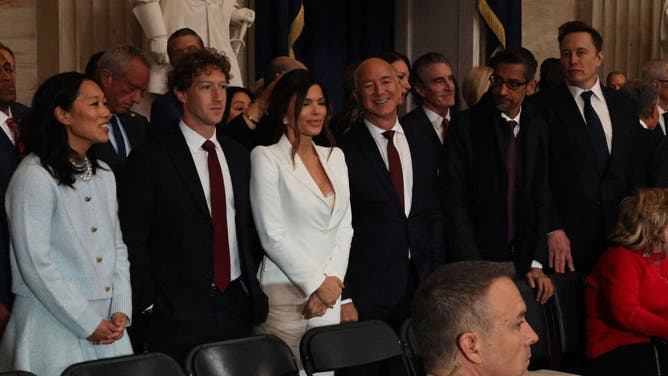Zuckerberg In The Age Of Trump: Challenges And Opportunities

Table of Contents
The Challenges: Facing Political Backlash and Regulatory Scrutiny
The Trump presidency presented a series of formidable challenges for Zuckerberg and Facebook. The platform became a focal point of intense political debate, facing accusations of enabling the spread of misinformation and foreign interference, while simultaneously navigating a rapidly shifting regulatory landscape.
Facebook's Role in the Spread of Misinformation
Facebook's role in the spread of misinformation during the Trump era sparked widespread controversy. The platform became a battleground for fake news, propaganda, and foreign interference campaigns, significantly impacting the 2016 US presidential election and subsequent political discourse.
- Cambridge Analytica Scandal: The misuse of user data by Cambridge Analytica to influence political campaigns exposed serious vulnerabilities in Facebook's data security practices and raised serious ethical concerns.
- Russian Interference in the 2016 Election: Investigations revealed that Russian operatives used Facebook to spread divisive content and influence the election outcome, highlighting the platform's susceptibility to malicious actors.
- Legislative Responses: The controversies spurred increased calls for stricter regulations on social media platforms, including demands for greater transparency and accountability in content moderation. Public perception of Facebook plummeted, leading to significant reputational damage.
Navigating Increasing Government Regulation
The Trump administration, along with regulatory bodies globally, intensified scrutiny of Facebook's business practices. This resulted in increased regulatory pressure across several fronts:
- Antitrust Lawsuits: Facebook faced multiple antitrust lawsuits alleging monopolistic practices and stifling competition within the social media landscape.
- Data Privacy Concerns (GDPR): The implementation of the General Data Protection Regulation (GDPR) in Europe forced Facebook to adapt its data handling practices, impacting its global operations.
- Section 230 Debates: The ongoing debate surrounding Section 230 of the Communications Decency Act, which shields online platforms from liability for user-generated content, created uncertainty and potential legal risks for Facebook. Zuckerberg's responses to these regulatory challenges involved a combination of lobbying efforts, policy adjustments, and public pronouncements aimed at addressing concerns.
The Erosion of Public Trust and Brand Reputation
The confluence of these challenges severely eroded public trust in Facebook and Zuckerberg's leadership. Negative media coverage, public criticism, and a series of high-profile crises contributed to a decline in user engagement and investor confidence.
- Key Public Relations Crises: The Cambridge Analytica scandal, along with ongoing concerns about data privacy and misinformation, damaged Facebook's brand image significantly.
- Impact on User Engagement: Some users reduced their Facebook activity or deleted their accounts in response to the controversies.
- Stock Price Volatility: Facebook's stock price experienced volatility reflecting investor uncertainty about the company's future prospects amidst regulatory and reputational challenges.
The Opportunities: Adapting and Innovating in a Changing World
Despite the considerable challenges, the Trump era also presented opportunities for Facebook to adapt, innovate, and reshape its strategies.
Capitalizing on Political Polarization and Social Media Engagement
The heightened political polarization during the Trump era led to increased user engagement on Facebook. Facebook adapted its algorithms to capitalize on this trend, prioritizing content that generated high levels of interaction, often at the cost of amplifying divisive narratives.
- Algorithmic Changes: Facebook's algorithms were tweaked to promote content that sparked engagement, including politically charged posts and comments.
- Impact on User Behavior: This approach further fueled political polarization and echo chambers, raising concerns about the spread of misinformation and extremism.
- Potential Consequences: The amplification of divisive content contributed to societal divisions and raised questions about Facebook's responsibility in shaping public discourse.
Expanding into New Technologies and Markets
To mitigate risks associated with regulatory scrutiny and declining public trust, Facebook invested heavily in diversifying its business and expanding into new technological frontiers:
- Metaverse Investments: Facebook's significant investments in virtual reality (now Meta) aimed to create a new platform for social interaction and establish a foothold in the burgeoning metaverse.
- Artificial Intelligence: Facebook continued to invest heavily in AI for content moderation, ad targeting, and other key business functions.
- Strategic Goals: These diversifications aimed to reduce reliance on its core social networking platform and explore new revenue streams.
Rebuilding Trust Through Transparency and Accountability
In response to criticism, Facebook implemented various initiatives aimed at improving transparency and accountability:
- Content Moderation Policies: Facebook made efforts to refine its content moderation policies and improve the detection and removal of harmful content.
- Data Privacy Measures: The company introduced new data privacy measures to comply with regulations and address user concerns.
- Communication Strategies: Zuckerberg and Facebook attempted to improve communication with users and stakeholders to rebuild trust. However, the effectiveness of these measures in fully restoring public confidence remains a subject of debate.
Zuckerberg's Legacy in the Trump Era – Lessons Learned and Future Outlook
The Trump era profoundly impacted Zuckerberg and Facebook. While navigating significant challenges, Facebook also found opportunities for growth and innovation. Zuckerberg's leadership during this period was marked by both successes and failures, shaping the future landscape of social media and the complex relationship between technology and politics. The lasting implications of this era will continue to influence the industry for years to come. The intersection of Zuckerberg and Trump's influence remains a crucial area for ongoing analysis. Explore further research on organizations like the Brookings Institution and the Center for Strategic & International Studies to gain a deeper understanding of this complex relationship.

Featured Posts
-
 Rare Earth Supply Chain Issues Hamper Teslas Optimus Humanoid Robot Project
Apr 24, 2025
Rare Earth Supply Chain Issues Hamper Teslas Optimus Humanoid Robot Project
Apr 24, 2025 -
 Trump Immigration Policies A Wave Of Legal Opposition
Apr 24, 2025
Trump Immigration Policies A Wave Of Legal Opposition
Apr 24, 2025 -
 Remembering Jett Travolta John Travolta Shares A Photo On His Sons Birthday
Apr 24, 2025
Remembering Jett Travolta John Travolta Shares A Photo On His Sons Birthday
Apr 24, 2025 -
 Tzon Travolta O Thrinos Gia Ton Thanato Toy Tzin Xakman
Apr 24, 2025
Tzon Travolta O Thrinos Gia Ton Thanato Toy Tzin Xakman
Apr 24, 2025 -
 Deportation Flights A New Revenue Stream For A Startup Airline
Apr 24, 2025
Deportation Flights A New Revenue Stream For A Startup Airline
Apr 24, 2025
